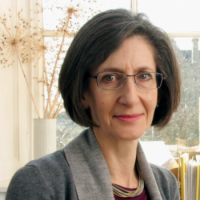By Jamie Weinman, JD 2004
Why would members of the student body and faculty of the University of Toronto Law School gather to hear a lecture on United Kingdom counter-terrorism law and how it applies to UK universities? Lucia Zedner, delivering the annual Cecil A. Wright Memorial Lecture at U of T’s Jackman Law Building on October 16, 2017, left no doubt that her lecture’s title, “Counterterrorism on Campus: A Threat to Academic Freedoms?” was not just about how the issue had played out in her country, but how it would play out in Canada and elsewhere. “Where the UK goes first, other common-law jurisdictions too often follow,” said Zedner, a Senior Research Fellow and Professor of Criminal Justice at All Souls College, Oxford, and a member of the University of Oxford’s Centre For Criminology.
Following brief opening remarks by University of Toronto Dean of Law Ed Iacobucci, Zedner was introduced by U of T Law Professor Malcolm Thorburn, who mentioned that she had focused much of her recent work on “the related topics of security and preventative justice.” Zedner added that the central dilemma she wanted to address in this talk was “the paradox of the security state” – the fact that the state has a duty to keep us collectively secure, but by doing so, can threaten the security of individuals.
In the UK, due to what she described as an increasingly prevalent view “that universities have themselves become sites of radicalization,” they have been under increased legal pressure to co-operate with the government in preventing it. This pressure, Zedner explained, creates another paradox: putting pressure on universities to protect against radicalization can “trample on the very institutions and values that we seek to protect.”
...Putting pressure on universities to protect against radicalization can “trample on the very institutions and values that we seek to protect.”
To illustrate what she meant, Zedner built much of her lecture around one short sentence from section 26 of the UK's Counter-Terrorism and Security Act of 2015, which states that a university is one of several specified authorities that "must, in the exercise of its functions, have due regard to prevent people from being drawn into terrorism.” This, she said, was known as the “Prevent Duty,” and the vagueness of the language helped explain part of the problem with the way it been applied: since the language is so unhelpful, universities must instead rely on “accompanying statutory guidance” issued by the Home Secretary.
Zedner argued that this reliance on guidance documents – a familiar feature of modern statutory interpretation – was a problem in itself, due to their lack of democratic accountability. But it also made the Prevent Duty massively confusing. “I could fill several screens with the guidance documents,” she said. “There have been six separate statutory guidance documents since 2015, but rather worryingly, there are also revised guidance documents, in addition to which, every single institution is required to issue its own guidance documents.” At Oxford, there were at least 37 separate documents governing the interpretation of that short passage, and “they all differ.” This received an amused reaction from the crowd, clearly familiar with such interpretive nightmares. “I see someone’s already got his head in his hands,” Zedner noted, looking out into the audience.
The result of all this is to leave university authorities uncertain if they are fulfilling the Prevent Duty or not, and this can create limits on freedom of speech. One guidance document suggests that people should not speak on campus unless the risk of radicalization has been “mitigated,” and this has led to several instances in the last two years “when invitations to outside speakers, or the holding of conferences, have not been allowed to proceed by universities that are exercising caution under this statutory duty.” Zedner added that she didn’t blame the universities for this; the problem is inherent in the intertwining of higher education with the very different priorities of counter-terrorism.
And all of this may be based on an unproven premise. A theme Zedner returned to several times was that the Prevent Duty may be flawed in the assumption that people become radicalized on campus. “There’s been a woeful lack of substantiating evidence. Perhaps it’s the criminologist in me that wants to ask ‘where’s the statistics?’” There is evidence, she said, terrorists tend to be young and well-educated, and that has brought suspicion on universities – but that isn’t proof that the suspicion is justified.
There is evidence, she said, terrorists tend to be young and well-educated, and that has brought suspicion on universities – but that isn’t proof that the suspicion is justified.
After Zedner concluded her remarks, there was time for questions, including one from University of Toronto Law Professor Kent Roach, who asked Zedner whether these issues had made her re-think her previous work on preventative justice: "Is this really the worst?” he asked, referring to the Prevent Duty. “Or would you like to go back and re-do the last 15 years of ramping up counter-terrorism laws?" Zedner replied that one of the things this issue had brought home for her is that "the exercise of soft power can be a good deal less soft than it might appear.”
Appropriately for a duty few people understand, the lecture ended without a clear prediction of how it would play out in the future; Zedner said that the first test case, Butt v. Home Secretary (2017), had both supporters and opponents claiming victory. She left the audience suspecting that by the time universities know what is expected of them, it might be too late to undo the damage: “When the war on terror is cast as a war of ideas,” she remarked, “things do not look good for academic freedom.”

